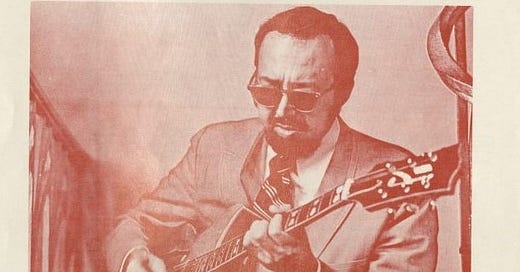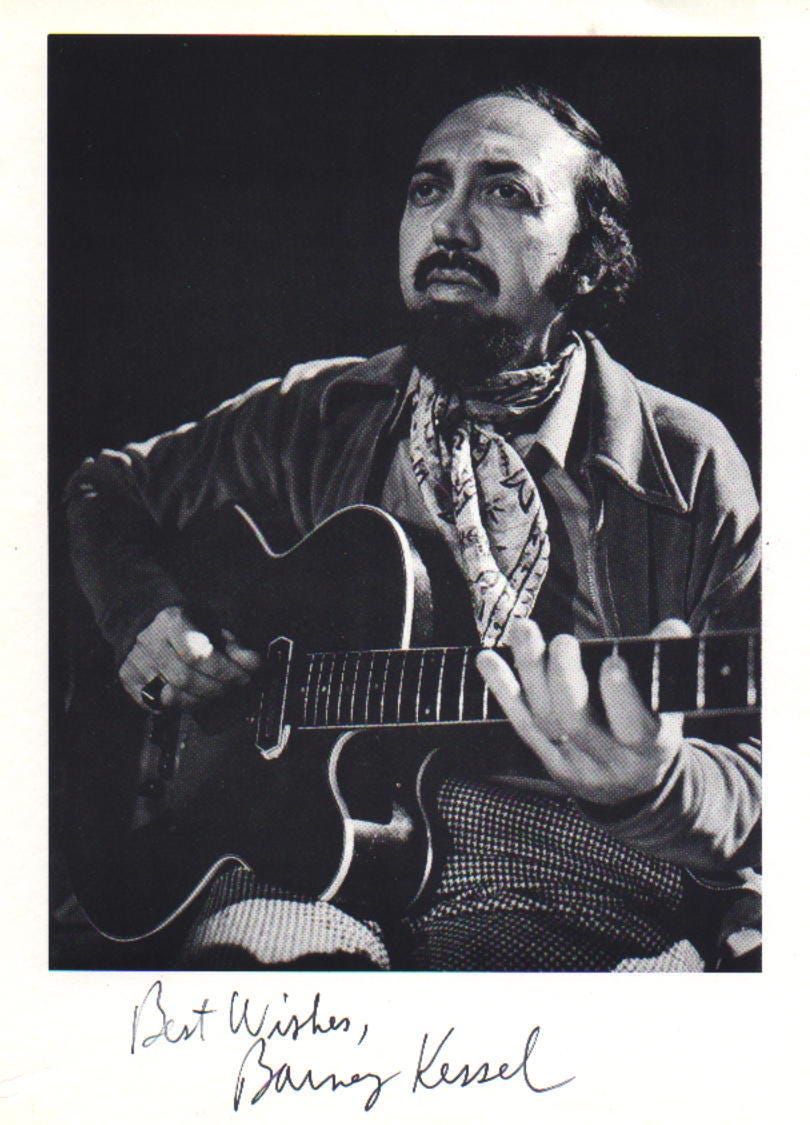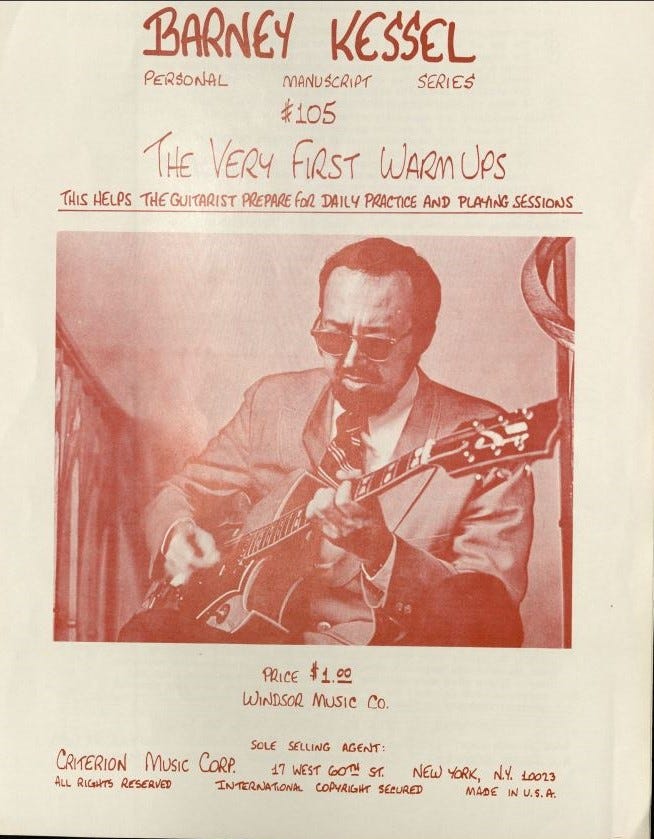During his teens Barney Kessel jammed with his hero Charlie Christian and played in Oklahoma swing bands. Moving to Los Angeles in 1942, he became a first-call studio guitarist and played bop in nightclubs. As the 1940s and 1950s progressed, he performed and recorded influential jazz with Artie Shaw, Bennie Goodman, Lester Young, Billie Holiday, Charlie Parker, and the Oscar Peterson Trio, to name a few. He was voted the number-one guitarist in DownBeat, Metronome, Melody Maker, and Esquire polls. He recorded several albums as a leader and saw his name attached to a Kay guitar. He turned in one of his most iconic performances in Julie London’s million-selling “Cry Me a River.”
During the 1960s Kessel’s pop sensibilities led to his becoming a charter member of the Wrecking Crew. As part of this elite studio ensemble, he played on hits by Elvis Presley, Sam Cooke, the Monkees, Sonny & Cher, the Beach Boys, and many artists produced by Phil Spector. In the 1970s Barney swung back to jazz, playing solo and alongside Herb Ellis and Charlie Byrd in the Great Guitars. From 1961 through 1974, Gibson sold Barney Kessel signature guitars.
In 1978, on my first day at Guitar Player magazine, I was appointed editor of Barney’s column. For a few years after that, Barney and I communicated on a monthly basis. Outspoken and always ready to help, he was a veritable font of jazz history and guitar wisdom. In addition to what he penned for the magazine, he shared his knowledge by giving seminars, authoring music lessons and books, and filming instructional videos. In his mid-60s, he was still playing live gigs around the world. I asked Barney if he’d share his views on how musicians can best prepare for gigs. Here’s a transcript of that July 22, 1986, conversation.
###
If you have a show at night, will you pick up a guitar and practice during the day?
Yeah. I usually practice every day, and I hardly ever practice over 45 minutes at a time. This is what I try to do, but if I don’t do it, I don’t feel dejected or spank my wrists or anything like that. I’ve kind of got a blanket rule that I try to practice 45 minutes three times a day—if I’m working. If I’m not working, I try to practice five times. If it doesn’t come up to the 45 minutes, then I try to think of playing in short ten-minute or even five-minute bursts. The main thing I focus on is not going too long without the guitar in my hand.
What do you normally do when you practice?
Various things. It all depends on where I’m at. For instance, I have various exercises that I’ve either learned from violin books or that I’ve learned for myself just through experience. In other words, it’s what the need is right now. It may be that I just need to get my right hand moving or it may be that I need to stretch my left hand. It may be that I need to practice in terms of strength or coordination between the two hands. I’ve got a whole bunch of exercises that maybe I haven’t done in a long time, so I’ll reach back and do one of those.
One form of practicing is to practice in a way to maintain what I’ve got. Now, I’m not speaking of improvising. I never practice improvising. In a way, if I were to practice improvising all through the day, then by the time I’m playing at night it’s kind of spent. Then I’d just be playing from reflex action. I’d be playing because I know how to play, not because it’s steaming up in me and I can’t wait to get to the thing to play. But if I don’t improvise as I practice, then it kind of builds up like pressure in a pressure cooker and I can’t wait to get to the job.
I do everything except improvise. For instance, if I had just made up a new song or made up an arrangement of a song that I’ve learned to play and it involves chords, I might be playing that song over and over because it’s new to me. I know how I want it to go, but I haven’t played it enough to have it really under my fingers. I may play the song, but I still won’t improvise on it. And the whole idea behind that is that there’s no way to sit down and play at night in a spontaneous way and have it real fresh unless you kind of psyche yourself out in such a way that it comes out fresh. I noticed years ago that if I’d sit and just jam all day, I’d play at night but it doesn’t have this thing like it’s eager to jump out of the pressure cooker.
How do you prepare yourself during the last two hours before going onstage?
I do very little in that way, except to be very relaxed. I might read some poetry. I used to drink two glasses of wine with my meal, and if I was playing at a place I might have a glass of wine at intermission. That is not a problem in any way, and I’ve never had any whiskey in my life. But I’ve found that when I’m playing, it’s better if I don’t have anything to drink during intermission except water. It’s this simple: I have more control and awareness without it.
I’ve got a thing that I use before the gig, and it’s available through Windsor Music. It’s called The Very First Warm Ups. What this involves is 102 exercises. You don’t even have to look at the music, and in doing them you will have moved all of your left-hand fingers in every possible combination mathematically. In the first phase, it will have moved all on one string. In the second phase, it will have moved between two adjacent strings. And in the third phase it would have moved between any two strings that are separated by one string in the middle, involving a string skip. It takes twenty minutes at the most—of course, that depends on the speed that you do them. At the speed I do them, it takes twenty minutes.
They can even be reduced mathematically to be written on the back of a business card. I carry one with me. It’s set up with just the numbers, but those numbers mean something in terms of the frets and the fingering. It represents being able to very quickly and scientifically go through 102 separate exercises where you move all your fingers in your left hand in every possible combination. And you move the pick. My feeling on that is this: Anyone studying this method will find that it may open up their minds to creating some other exercises or doing something else, like saying, “Gee, I see what that is. Why couldn’t we do this or the other?” And that’s well and good, because that’s the way creativity goes.
The other thing is, I feel it’s not the end-all of everything. It’s not the ultimate thing. But if I simply want to warm up, especially in terms of single notes, I can’t think of anything that’s a better use of twenty minutes. It’s called The Very First Warm Ups, and it’s part of my Personal Manuscript Series. I’ve got several teaching lessons that have been printed up. They look just like sheet music, except it’s a lesson. It shows both the notes and the diagrams and shows exactly how to do it and what it’s supposed to do. And, as I say, later the whole thing can be reduced to simply numbers on the back of a business card. Then after that, they don’t even need it. [Scans of The Very First Warm Ups, along with Barney’s other lessons in the series, have been combined into a free downloadable pdf: Personal Manuscript Series.]
Do you have advice for someone who gets the jitters before performing? Have you found anything that helps?
Yes, I have. I don’t have the jitters. I don’t want to sound superior with this—I don’t have them because I’ve been playing so long that I’m quite comfortable playing. But I’ve dealt with this problem in others and at seminars I’ve conducted. Some of the issues for guitarists and all musicians that need to be covered involve dealing with many psychological factors and not just the music. You know, in the final analysis, when someone comes out as a great performer, it’s based on many considerations. And this is one of them.
The jitters might come from several different things, and you can work on them. Now, I’m just pre-supposing, but one of the things, especially in young players, is a feeling that deep down they’ve got a low self-image or low self-concept. They don’t really feel they are as good as they should be, that deep down they feel less than adequate. There’s jitters about that.
There’s also jitters that there are going to be great musicians or critics that are out there and are going to be listening to them. They’re not that sure of what they’re doing sometimes. Or even if they’re sure in terms of accuracy, they’re not sure of its value—what its value is.
Another thing that makes players very jittery is a sense within them of competitiveness all the time. There’s a feeling that there are other people in the field and they’re competing with them, and they’re not as good as this one or they’re not as fast as that one. They don’t know as many songs as this other one. They are always competing. And among young people, not only is that competition prevalent, but added to it, if the person they’re thinking of as their competitor is not only better but even younger, then that adds to it. Because they’re thinking about age: “I’ve got to make it by a certain age,” or, “I’m 23 and this guy is blowing me away, and he’s only 20.”
What should they be thinking about?
I’ll put it this way: They should never forget that music should be fun. That’s number one. The quickest way to relax is to close your eyes. Now, that doesn’t take much. When you close your eyes, you blot out the visual things that you’re reacting to. The next thing is to breathe evenly. A curtain opened once, and there were 10,000 people out there. They weren’t there for me, they were there for a couple of other groups. I played first. I wasn’t used to it. I wasn’t expecting it, and it made my heart race fast. What I did was I just turned my head away from the audience and I just breathed with my mouth wide open. I took in several gulps of air. I found that this immediately brought down the speed of my heart and relaxed me. Breathing!
Another thing—and this may sound corny—but this all goes through my mind very quickly when I’m playing. It’s not to hype myself, but I find I feel good for doing it. What I think of real quick is, “I’m glad I’m alive and in good health, and I’m glad that I’m doing something for a living that I would be doing anyway for fun. And I’m glad that a lot of people appreciate it and enjoy it and make it possible for me economically to make a living out of something that I love to do anyway.” All of this just kind of filters through me.
And I don’t feel competitive. I feel that everyone is different, and we all can’t be the same. We can’t. I’m grateful that I’m Barney Kessel, and I’m just going to try to be the best Barney Kessel I can be, knowing that at any time there’s someone that’s younger, older, better looking, uglier, fatter, thinner, with more hair, less hair. They know how to play certain techniques that I don’t know. And I know some they don’t know. It’s ridiculous to try to compare, because as you look around there will always be somebody that does something else.
The main thing is to think of being your own choo-choo train on your own track. And all you gotta do is get from one railroad station to the other on your own train, on your own track. And the fact that there are other guitar players who play very well or play fantastic and have great commercial success doesn’t keep you from doing what you gotta do. All of that permeates me. I’m not trying to snow myself or tell myself I’m really good, but it gives me a relaxed feeling.
And remember: If you’re nervous when you’re going to play, breathe. Sometimes when people are reading [charts] in the studio they see something coming up that they may not be able to execute—either because of the technical passage or because it’s rhythmically very complex. What happens is as it comes toward them, they need to breathe evenly. But what they do is they stop breathing entirely. When a guitarist or any musician finds themselves approaching a tense situation, not only do they breathe unevenly, which would be in a rather haphazard manner, which would not be good, but they stop breathing altogether.
So it’s important to breathe, to get rid of any concerns about the competition, and get over the fact that someone out there is going to judge you. You can’t keep ’em from judging you. I’ve played when I thought it was better than usual, and I’ve had write-ups that said it was less than usual. And I’ve had it just the opposite. I don’t think it was ever bad, but it might have been not-too-inspired. It might have just been reflex action and it was written up like it was really something special. So you never know how someone else is going to perceive you.
That’s the way I feel about it. I feel that some of these things are burdens that a musician doesn’t have to carry around needlessly. Young guitar players have to come to grips with the whole idea of competition and picking out certain little specified things, like, “If I can play the blues, I’m really making it.” Or “If I can play fast, I’m really making it.” Or “If I got a hit album, I’m really making it.”
Instead of focusing on that, focus on the idea that they’re gonna be a musician all their life. Think about it. It’s just like a baseball player thinks: “Well, I struck out today, but that doesn’t mean I’m a bad baseball player.” Go on and play the game for all your life and relax. If you really do feel grateful that you’re playing music rather than parking cars for a living or pumping gas, acknowledge it to yourself and feel it. And be yourself—subject to influences. There’s a great difference between copying and being influenced.
Thanks for the interview, Barney.
Thank you very much! I appreciate you thinking of me.
###
Barney Kessel passed away at the age of 80 on May 6, 2004.
For more Barney, check out our 1981 interview, which focuses on his recollections of meeting and jamming with his greatest musical inspiration:
To help me continue producing articles, interview transcriptions, and podcasts, please become a paid subscriber ($5 a month, $40 a year) or hit that donate button. Paid subscribers have complete access to all of the 200+ articles and podcasts posted in Talking Guitar. If you’re already a paid subscriber, thank you for your much-appreciated support!
©2025 Jas Obrecht. All right reserved.





Man, this is so useful, Jas - thx for resurfacing!
I love the idea of improvising as you practice, so you keep that freedom alive even during repetition-heavy stages like practice.